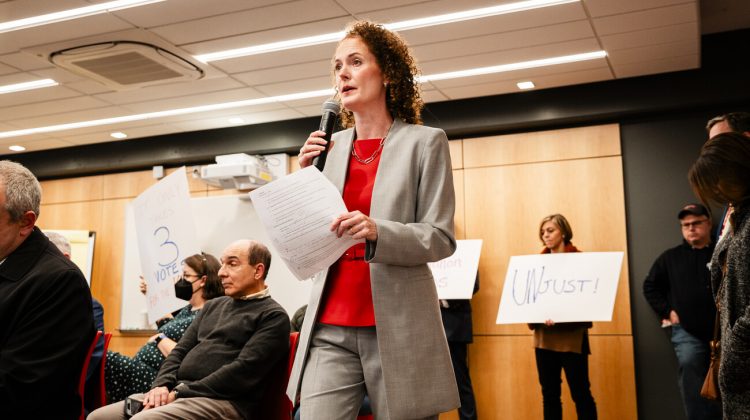SAUGUS — A rebuttal crafted by former Superintendent of Schools Erin McMahon ahead of her termination earlier this month thoroughly defended her conduct and sought to address each of the concerns raised about her performance in the Arrowood LLP report used by the committee as grounds to remove her.
The report provided significant detail into the allegations, which came to light when former Deputy Superintendent Margo Ferrick alleged McMahon “engaged in self-dealing or had conflicts of interest in the selection of a certain professional development provider for the school district, engaged in fraudulent activity in the payment of invoices to a certain professional-development provider for the school district, inappropriately used grants funds, and had a significant amount of time spent away from the district.” The report investigated McMahon’s relationship with Relay Graduate School of Education, which conducted professional development for the district and McMahon did paid consulting work for, and with Excellence Reflex Consulting, particularly consultant Chi Tschang, who was hired to provide additional services beyond Relay’s programming.
McMahon and her attorneys were only given a copy of the entire document after her contract was terminated last month. However, they received an executive summary when it was completed in August.
In the rebuttal, McMahon reasserted her belief that the School Committee violated her contract by failing to provide written notice of any concerns about her performance for “study, disposition, or recommendation.” Section 8.8 of her contract, concerning “prompt notice of complaints of concerns,” reads, “any criticisms, complaints, and suggestions called to the attention of the committee shall be promptly and discreetly referred to the superintendent.” As a result, McMahon said, she was denied her ability to take remedial action.
“The School Committee… never afforded me the opportunity to respond,” McMahon wrote.
McMahon filed a demand for arbitration in February. However, it is unclear whether or not the case has been heard before an arbitrator after a pair of attorneys withdrew from representing the committee. The arbitration case is ongoing.
The rebuttal also laid out perceived procedural errors regarding the investigation conducted by Arrowood on behalf of the committee. While the committee empowered Chair Vincent Serino to “retain further professionals such as hiring consultants, auditing firms, special counsel, to clear up this matter” in a Jan. 19 executive session, McMahon alleged that members never had grounds to turn the process over to Town Manager Scott Crabtree, who ultimately hired the firm.
However, the town charter permits only the town manager to hire special counsel, and when there is a possibility of litigation in which the town would be a party, the town manager’s office would become involved, according to Town Counsel John Vasapolli. The charter explicitly permits the town manager to “employ special counsel to assist the town counsel whenever in his judgment it may be necessary.”
McMahon also doubled down on her allegation that her treatment was a result of her gender and noted that she filed a charge of discrimination with the Massachusetts Commission against Discrimination, naming both Crabtree and Serino as offending parties.
The report did not address the discrimination complaint but noted that Ferrick, who submitted the initial complaints, is also a woman.
McMahon, who did not know Ferrick did so, wrote in the rebuttal that “our schools cannot possibly educate (women) to be leaders given how the men in leadership positions in the Town of Saugus behave towards women who are leaders, like me.”
McMahon also argued that the report’s production delay “suggests that someone was dissatisfied with the initial investigation result.”
In the report, Arrowood wrote that the delay resulted from the firm attempting to employ Powers and Sullivan LLP to review some of the financial documents obtained during the investigation. The firm did not deliver an analysis to Arrowood until July 27, 2023. The report was completed on Aug. 17.
In the report, Arrowood noted it did not have subpoena power and thus was unable to compel the production of documents or testimony, and as a result, investigators could not “confirm the full scope of payments made from Relay to Superintendent McMahon, or whether Superintendent McMahon received payments from other sources.”
In her rebuttal, McMahon argued the firm made “no attempt” to speak with the third parties with direct evidence regarding the concerns raised with her performance. She noted that in an affidavit, Tschang testified that he submitted invoices to the district as a “daily rate,” essentially a lump sum not broken down by expenses and hourly costs, at the request of Ferrick. Ferrick, though, told investigators she instructed Tschang to do so only at McMahon’s request. For her part, McMahon denies involvement in the “review or approval of the bills.”
Regarding the allegations about her work for Relay, which the report contended is a violation of the town charter because McMahon failed to disclose she was being paid by a vendor with a contract in town, McMahon noted that she tried to donate her fee for the consulting work to the Saugus Education Fund. When she was told she could not do so, her friends and family donated more than the amount she was paid to the fund to cover the cost of lunch for professional development. Serino, the committee chair, thanked her for arranging the donation.
She also contended that Serino and former Chair Tom Whittredge were aware of her work for Relay. Both men told investigators they were not.
And, while Tschang sent many of his invoices directly to McMahon, she said she forwarded them directly to Executive Director of Finance and Administration Pola Andrews. McMahon said she relied on other administrators to review Tschang’s invoices in the sort of detail where they would have identified issues — including Tschang seeking reimbursement for the purchase of alcohol. Tschang testified doing so was simply a math error.
According to the report, Andrews did notify McMahon that the purchase of alcohol was included, and McMahon said she would discuss it with Tschang. McMahon told Andrews that Tschang was not allowed to charge for alcohol.
Regarding her time out of district — 75.5 days across a year and a half, including 40.5 days between July 1, 2022, and Jan. 19, 2023, the start of her leave — McMahon noted that her contract explicitly permits professional development activities and the committee was aware of her pursuit of a doctorate at Boston College when she was hired.
McMahon said the 40.5 days were split between 22 days of professional development, two personal days, two sick days, two telecommute days during the summer, and 12.5 vacation days.
“This job was the hardest thing I have ever done, and I took great pride in the work our team was able to accomplish in the brief time I was given,” McMahon writes. “I am dismayed and deeply aggrieved by what has happened since.”





